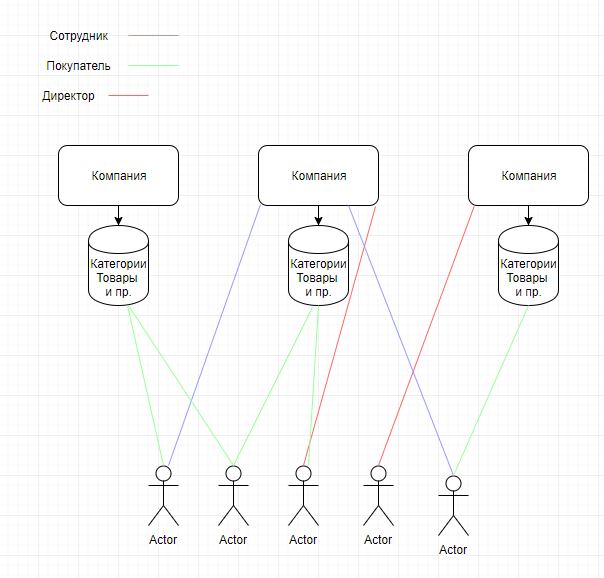Answer the question
In order to leave comments, you need to log in
How to resolve through RBAC the setting of rights depending on the selected "entity"?
I can't figure out how to properly use RBAC for this situation (and whether it should be used here at all).
Let me give you an example of work.
The service is divided into two conditional "Cabinets" - for Buyers and for Sellers (Directors and Employees of the company).
There is a "Companies" database, various entities are associated with companies - "Categories", "Products", etc.
Each company has a Director (has access to the interface for Sellers and can manage the entire company - edit products, categories, etc.), an employee (has access to the interface for Sellers and can only do what has been authorized by the Director). Only Buyers who have been granted access by a Director or Employee may have access to Company data.
At the same time, the same user can be in different companies in different roles (one as a Director, another as an Employee, for a third as a Buyer), and even in the same Company, a user can have the roles of Director/Employee and Buyer at the same time. 
It turns out that the main decision about what roles a user has is made at the Company level. The user selects a Company from the list of those to which he has access and, depending on the selected company, he receives certain rights.
All users are stored in a common users table and are linked to companies through the users2company intermediate table.
How it is better to organize the rights at such scheme?
PS. The system is built on Yii2, but I think that the principle of RBAC in Yii2 and Laravel is quite similar.
Answer the question
In order to leave comments, you need to log in
I don't know how much my experience will help. I'm just learning myself) but I did this:
3 tables
Roles
role_perms perms We
connect
roles and perms through manytomany.
We write the rules in AuthServiceProvider. Type
Gate::define('CREATE_PRODUCT', function($user){
return $user->canDo(3);
});public function canDo($perm_id) {
foreach ($this->roles as $role) {
foreach ($role->perms as $perm) {
if ($perm_id==$perm->id) {
return true; }}}}if (Gate::denies('CREATE_PRODUCT ')) {
abort(404);
}@can ('CREATE_PRODUCT’)
Код создания продукта
@endcanIf($user->isDirector() and $company->type(‘it’))
{
$user->roles()->attach($id);
}public function getRole($name)
{
return $this->roles()->where('name', $name);
}$user->company($id)->roles();
Didn't find what you were looking for?
Ask your questionAsk a Question
731 491 924 answers to any question